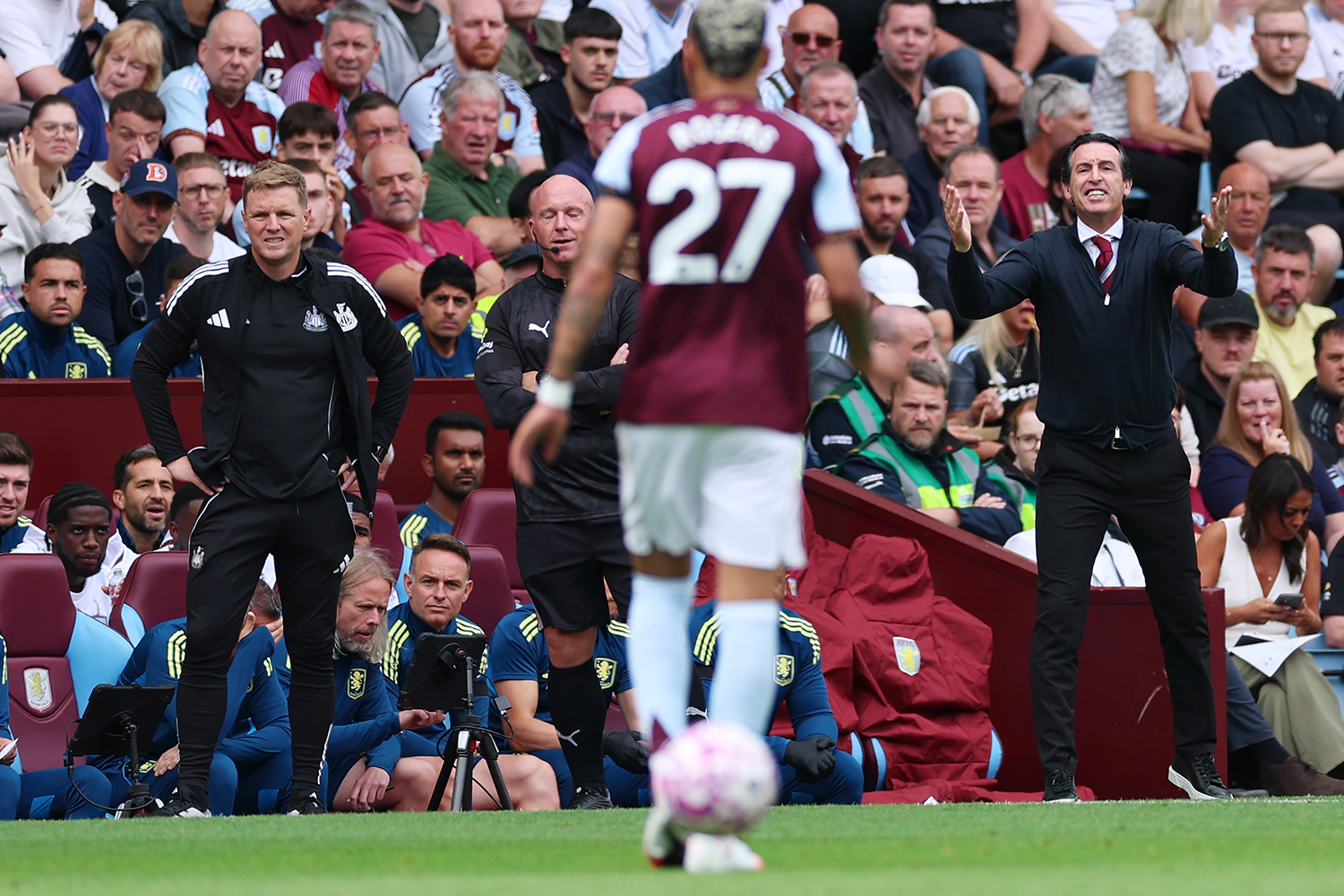In his first set of programme notes of the season, Unai Emery made his point concisely, graciously and informedly. He did not use it as a chance to settle scores or make grand, sweeping accusations, designed to rile Aston Villa’s fans to fury.
Instead, he used one of football’s quaintest remaining traditions – the manager’s matchday column – to present a calm, rational view on its defining modern argument.
To précis: Emery understands why football introduced financial controls. Versions of the rules that have made Villa’s summer recruitment “challenging”, he wrote, were adopted “to avoid bankruptcies and payment defaults”.
He believes, however, that they should be reviewed, on the grounds that this initially “good tool” has served to create a caste of clubs who will “never be allowed to dream”.
Emery’s encapsulation of the argument is an unusually clear, succinct one, but it is not – without meaning to sound at all churlish – especially novel. This is the story that Villa have been telling themselves for several years: that the Premier League’s profit and sustainability regulations (PSR) act as a curb on their ambitions. It is an idea so embedded that John McGinn sees it as the “way football is set up these days”.
Villa are not alone in this. Their opponents last weekend, Newcastle, have precisely the same view. “PSR doesn’t sit easy with me, I don’t like it,” Alan Shearer said on BBC Radio 5 Live this week. “You get to a certain point, like Newcastle and Aston Villa have, and then all of a sudden you’re hit, there’s a juggernaut in front of you.”
Shearer no longer has an official position at Newcastle, of course, but it is likely nobody at the club disagreed with him. Newcastle, like Villa, see themselves as the victims of something close to a conspiracy; as far as many fans and quite possibly a few executives are concerned, they are being held back by artificial rules specifically designed to stifle competition.
Sympathy for that stance is not limited to the north east and the west Midlands. The matter may be less urgent at Everton and Nottingham Forest and – for different reasons – Manchester City, among others, but the underlying belief is the same.
It is almost common consensus now that PSR exist to maintain the status quo, that financial controls are a manifestation of the self-interest of the hated “Red Cartel”. There is a reason it has caught on, of course. It is a good story. It is compelling and emotive. It has a clear villain, a cadre of clubs whom everyone is predisposed to dislike anyway. And it seems to be borne out by reality. It is just a shame that it is not quite true.
It is not true in the specific cases of Aston Villa and Newcastle United because it ignores the parts of the story that do not quite fit. Villa, for instance, have spent somewhere in the region of £700m on players since they were promoted back to the Premier League in 2019. Only a baker’s dozen of clubs have spent more on players than Villa in that period. Not in England. Around the world. It is more than Bayern Munich and AC Milan. It is a very generous interpretation of dreams being inhibited.
Newsletters
Choose the newsletters you want to receive
View more
For information about how The Observer protects your data, read our Privacy Policy
The same goes for Newcastle, who have spent more than half a billion pounds on players in the four years since their takeover by the PIF. Only eight clubs have spent more in the transfer market since 2021, and one of them is their stablemate, Al Hilal. Like Villa, that took them into the Champions League. It is very hard to make an intellectually honest argument that PSR has prevented either one of them spending money.
The reason both now have limited room for manoeuvre is because they have both found selling significantly harder than buying. PSR are not perfect by any means. One reason is well documented: the rules as they are currently formulated encourage clubs to view academy products as cows to be fattened up for market, rather than players to be nurtured for the first team. Emery alighted on another in his programme notes, namely that revenue tends to run downstream of sporting success.
Chelsea have, intentionally or not, highlighted a third: PSR is a cashflow game. It is weighted so that the cost of any player you buy is spread across the duration of their contract, but the value of any player you sell can be recorded in one tasty lump sum. As long as you sell – and ideally sell well – then your spending can essentially be unlimited.
The morality of the extreme to which Chelsea have taken this is a different matter, but in a certain light it could be regarded as a sort of test for how good any particular team are at trading. And Newcastle, in particular, are not good: they have sold players for just £150m or so since the Saudi takeover. That is what is holding back Newcastle – and to some extent Villa, though their record has improved considerably.
There is, though, an even greater unsaid in the feverish, loaded and often misleading debate over PSR: the nature of the alternative. Those clubs, led by Newcastle, Villa and City, who would abolish the rules are presented by those who sympathise with them as great egalitarians, fighters for the free market. If only everyone could spend whatever they liked, the logic goes, then football would be a fairer place.
Except, of course, that it wouldn’t. There is nothing unusual about regulation in sport. Formula One restricts what modifications teams can make to their cars. America’s major leagues have salary caps and luxury taxes and draft picks. You are not allowed to use engines in the Tour de France. Even the IPL and the Hundred, two box-fresh competitions, sport for private equity, have allotted budgets and salary bands. None of it exists to curb ambitions or crush dreams, but because sport – now more than ever – has to find a way to protect the idea of competition, to recognise that sport decided by chequebook is not sport at all.
And that, ultimately, is what the teams chafing against PSR want: not to abolish the elite, but to replace it; not to level the playing field, but to tilt it in their favour.
Whether that is preferable or not is a matter of taste, but it is at least a case worth making; it should hardly be controversial to suggest that even the Premier League would suffer as a spectacle if it became nothing but a contest to establish which club can attract the richest owner.
It is striking, then, that the Premier League itself has done so little to make its case. The league’s chief executive, Richard Masters, has never explained to fans why financial regulation is necessary, let alone with the clarity of Emery’s programme notes.
The debate over regulation is a battle of stories. The version that is winning is not necessarily the one that is right. It is the one that has been told.
Photograph by Dan Istitene/Getty Images



